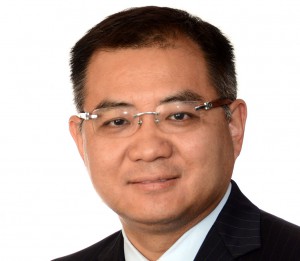Struggling to reverse a sharp decline in sales in the world’s largest automotive market, Ford Motor Co. has gone outside for a new CEO. It poached Jason Luo, who had been running auto parts supplier Key Safety Systems, to run its Chinese operations starting immediately.
Born in China, but educated in the U.S., Luo had spent the last decade in Michigan transforming the Chinese-owned KSS into a major player in the auto safety field. Just two months ago, Key agreed to buy most of the assets of bankrupt Japanese airbag supplier Takata Corp.
“Jason’s leadership and track record of business growth and transformation in China make him the ideal person to lead Ford in the world’s largest vehicle market,” said Peter Fleet, Ford group vice president and president, Ford Asia Pacific. “He will help us raise our vision in China as we become more nimble and operationally fit, expand vehicle electrification and begin to localize Lincoln vehicle assembly.”
Ford was a relative latecomer to the Chinese market, waiting for years after players like General Motors and Volkswagen AG established a dominant presence. When it finally launched there it faced a variety of struggles – among other things, finding local partners as required by Chinese law.
(Ford signs deal to jointly develop EVs in China. For the story, Click Here.)
Investing billions of dollars in new products and plants, Ford finally had begun to make some major inroads before it hit a snag at the end of 2016. The overall Chinese market has been losing momentum from the days when it was posting high double-digit growth every year, sales up just 3.8% for the first half of 2017, but Ford has been in negative territory, its sales tumbling 7% through the end of June.
A variety of factors have been at work, including gaps in its line-up. While Ford’s Lincoln brand has shown promise in the two years since it was launched there, it still isn’t producing vehicles in the market, which means its imports are saddled with hefty tariffs, limiting growth opportunities. Lincoln won’t start producing some of its product line in China until 2019, initially focusing on SUVs.
Ford is also looking to expand production of SUVs carrying the flagship Blue Oval brand’s badge, and is searching for additional local partners.
Just this week, meanwhile, it announced it is exploring a new joint venture with Anhui Zotye Automobile Co., a Chinese company better known for producing automotive and motorcycle parts. Together, the partners would create an entirely new Chinese brand of electric vehicles.
(Click Here for the latest on Ford’s overall sales in China in 2017.)
“This presents us with an exciting opportunity to leverage each other’s strengths,” Zotye chairman Jin Zheyong said in a statement.
The Beijing government has been pressing automakers, both foreign and domestic, to rapidly expand sales of battery-cars to help address the nation’s endemic smog problems. So far, sales have been modest, at best, leading the industry to press regulators to back down. But they’ve so far refused to do so, and a number of local governments – in more than a dozen major cities, including Shangai and Beijing – have enacted restrictions of their own to promote electrification.
All that means that in his new role, Luo will have a full plate of issues to deal with. But he has already shown himself a skillful negotiator. He helped put together the deal that sold Key Safety Systems to China’s Ningbo Joyson Electronic Corp. for $920 million. And he led the $1.6 billion acquisition of Takata, the embattled Japanese supplier whose airbags have been blamed for as many as 18 deaths worldwide.
“He’s got the experience of elevating KSS into a global company and Ford wants to further localize, so it’s not a surprise to see him come over,” Xing Lei, chief editor of the China Automotive Review, told the Reuters News Service.
(To get the details on Ford’s plans to move Focus production to China, Click Here.)
Born in China and fluent in both Mandarin and English, Luo officially joins Ford next week. He earned a bachelor’s degree in engineering at the Beijing Institute of Technology before coming to the U.S. he got a masters degree in mechanical engineering at the University of Toledo, Ohio before adding an MBA at Michigan State University.


